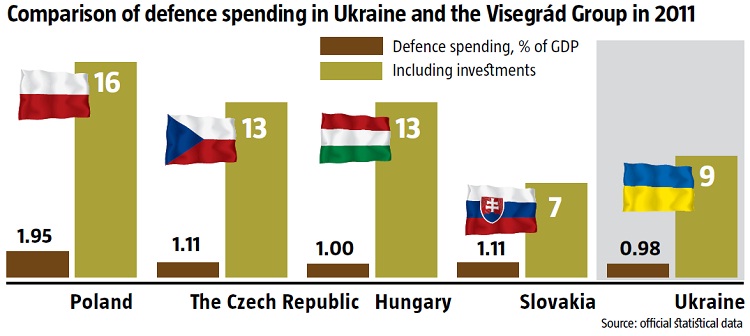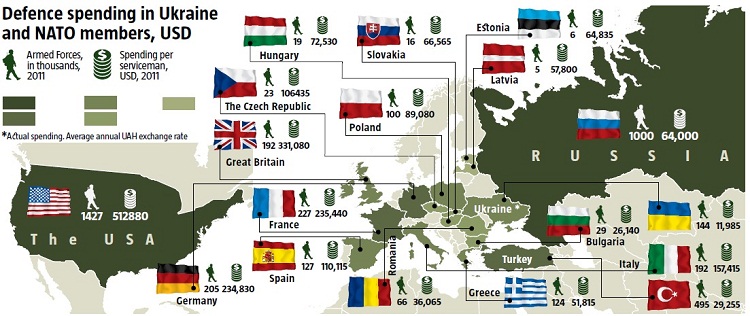Ukraine is still in the grey zone of continental security, squeezed between two blocs: NATO (the EU) and Russia (CSTO, EurAsEC, Customs Union). Having declared the non-aligned status officially, the government has also expressed intention to integrate Ukraine into the European security system. The Ukraine-EU Association Agreement contains the relevant provisions. However, limited real steps to European integration, underfunded Armed Forces and the lack of a strategic vision leave Ukraine outside collective security, threatening its sovereignty as pressure from Russia grows.
THE NON-ALIGNED STATUS
Although both government and opposition representatives welcome European security transformations, Ukraine’s active participation in the continental security system is quite problematic for three main reasons: the values of the Ukrainian ruling elite are, in essence, more Russian or post-Soviet than European; technocratic helplessness reigns supreme in the security sector and strategic and operational management as well as analysis are lacking; the public at large is poorly informed and indifferent to security issues.
READ ALSO: Examining Weapons
Today, Ukraine continues to cooperate with both the EU and NATO, participating in NATO missions in Kosovo, Afghanistan, the Mediterranean, Iraq, etc. However, experts say that Kyiv’s cooperation with the alliance has become limited. Of NATO’s three past summits not one was with Ukraine. British political scientist James Sherr aptly said recently, that their relations today have become “technical and formal, lacking a spirit, warmth and persuasion.”
Pro-government experts have embraced the thesis that a non-aligned Ukraine can integrate with the EU security system but not with NATO. While feasible, this project is unlikely to truly guarantee Ukraine’s national security. It is unlikely not simply because NATO remains the main efficient security system on the continent but also because NATO and EU members are closely integrated and eager to complement each other. An October 2012 resolution of the European Parliament asserted the need to avoid duplicating EU initiatives in the pooling and sharing strategy and NATO’s “smart defence”. However, any close cooperation with NATO risks drawing criticism and pressure from the Kremlin, something that the Yanukovych regime wants to avoid.
(Click the picture to enlarge)
While cooperating with the European Union, Ukraine is mainly interested in participating in its tactical combat groups. Ukraine has already participated in a combat alert mission of the HELBROC group (Greece, Bulgaria, Romania and Cyprus) in summer 2011 by sending 10 staff officers, a company of marines with armoured vehicles and an Il-76 transport airplane. The frigate, Hetman Sahaidachny, with a helicopter and crew will join Antanta, an anti-piracy EU operation off the eastern coast of Africa.
Ukraine’s biggest project to date may be participation in the Visegrád Battle Group which will involve up to 3,000 military personnel. A decision to set up the battle group to carry out operations, aimed at crisis management and peace protection, was passed at the February summit in Warsaw. The project is quite ambitious, in that it is designed to operate on a permanent basis, implementing new military standards among member-countries. However, Kyiv has yet to make an official decision on joining this battle group.
UKRAINE’S PROSPECTS
In joint EU and NATO programmes, Ukraine could make use of its technological capacities, for example in the aerospace industry. However, Russia could object to Soviet technologies being used for this purpose. Thus the question is whether Ukraine will manage to cooperate with Russia and Europe at the same time, clearly separating the two. Equally problematic is Ukraine’s participation in NATO’s antimissile defence system.
READ ALSO: “The Black Sea Will Smile”
Military experts admit that Ukraine’s Armed Forces today lag far behind modern European armies in the technological aspect, in some areas they are also inferior to Russia’s military and have exhausted the potential they had since the late 1980s. As far as the technological advancement of the defence industry is concerned, Ukraine is still capable of making modern products in cooperation with Western enterprises. Today, Ukraine is losing out to Russia in aircraft engineering, primarily due to the inept management of government enterprises throughout its entire independence. Moreover, latest data shows that Ukraine will share its goodwill regarding the AN-140 airplane with Russia and will thus lose the advantage of being a centre of aircraft engineering R&D. Hence, Ukraine’s priorities may lie in developing its own armaments in cooperation with Western companies and modernizing its defence industry through the transfer of Western technology. The development of this area is possible, even with a non-aligned status, because in economic crisis conditions, Europe and the USA are interested in cooperation with third countries.

Another important and quite feasible line of cooperation is for Kyiv to accept Western aid to reform the security and defence sector. Throughout its independence, the Ukrainian government has received various types of aid in this field. As a result, some units of Ukraine’s Armed Forces and NATO countries are now mutually compatible; the Border Guard Service has been successfully reformed and Ukrainian officers have received training in the West. However, a number of fundamental elements of security sector reform have been eliminated. These include, among others, parliamentary oversight, the demilitarization of the sector has been virtually halted and corruption in the defence sector remains an urgent problem.
DIFFERENT VALUES ON THE RADAR
Western aid has been largely squandered and spent on the needs of bureaucrats. As a result, the military reform promoted by the Party of Regions today, calls for reducing the Armed Forces and rejecting participation in the European security system. According to defence experts contacted by The Ukrainian Week, the reform initiated by the government will involve reformatting and sometimes eliminating territorial operational and tactical-level command centres, which should have been turnedinto training centres for the formation of a large Armed Forces reserve, something a country with a self-sufficient defence system would need in order to guarantee its territorial security.
READ ALSO: Priority Changes
This raises the question of values in the defence sector. It may seem, erroneously, that this sector is essentially technocratic and functional, because national security is needed by countries such as Venezuela, Belarus and Switzerland alike. It can be claimed here that on the level of the power elite, Ukraine does not share European values, which are based on the vision that national security must minimize threats to individuals, communities and the state. The role of the government remains excessive in Ukraine as it is served, first and foremost, by a large police force rather than an army. Thus, Ukraine continues to move further away from the West. Norwegian analysts say that the European vision of defence is best reflected in the conception of a “security community” the member-nations of which are convinced that conflicts should not be resolved by force and have a collective sense of “we”, i.e., a common security identity.
READ ALSO: Ukraine-NATO: Summarizing 15 Years of Distinctive Partnership
So, is Ukraine prepared to be an independent player in the security sector? Will Ukraine’s vision and strategy transform depending on trends in Europe’s development? Civilizationally, Ukraine is closer to the “Atlantic” ideology of Central and East European countries than to pro-Kremlin security and defence integration projects. Therefore, Ukraine stands a fair chance of becoming an element of the European security system in the long-ter,. However, so far the official National Security Strategy proposes building a new architecture of European security in close cooperation and interdependence between the EU, Russia and the USA, but the current Ukrainian government seems to be more inclined to coordinate its policy in this segment with none other than Moscow.


